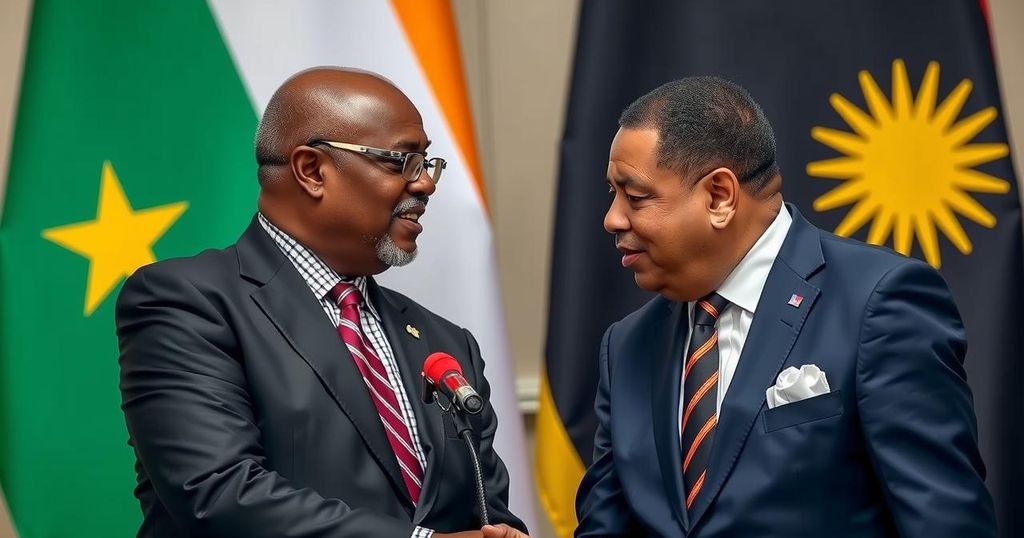Mnangagwa Engages Botswana’s New Leader to Rebuild Diplomatic Relations
Zimbabwean President Emmerson Mnangagwa met with Botswana’s new President Duma Boko on World Children’s Day to mend diplomatic relations after Boko’s unexpected electoral victory. The meeting aimed to foster cooperation on trade, security, and economic partnerships, recognizing the political shift in Botswana and its impact on regional dynamics, especially for liberation movements. Mnangagwa’s engagements signal a pragmatic approach to balancing ideological differences while prioritizing national interests.
On World Children’s Day, Zimbabwean President Emmerson Mnangagwa engaged in a significant meeting with Botswana’s newly elected President Duma Boko in Victoria Falls. This interaction aims to mend the frayed diplomatic ties following the surprising electoral loss of former Botswana President Mokgweetsi Masisi, an ally of Mnangagwa. The political transition in Botswana marked a crucial shift, as Boko’s Umbrella for Democratic Change (UDC) dethroned the Botswana Democratic Party, which had maintained a six-decade stronghold on power, prompting Mnangagwa to recalibrate relations cautiously. An insider highlighted that President Mnangagwa acknowledged the urgency of forming a strong cooperative relationship with President Boko, focusing on fostering bilateral trust to prevent missteps similar to those encountered with Zambia’s President Hakainde Hichilema. The dialogue encompassed vital topics such as trade facilitation, border management, security cooperation, and economic partnerships, emphasizing shared interests despite underlying political differences. The electoral success of Boko further indicates a potential disruption of the long-standing dominance of liberation movements in Southern Africa, which poses challenges to parties such as Zimbabwe’s ZANU-PF, South Africa’s ANC, and Mozambique’s FRELIMO. Notably, at Boko’s inauguration, both Mnangagwa and Masisi received negative reactions, contrasting sharply with the warm reception opposition figures garnered, showcasing a significant shift in the political landscape. Mnangagwa’s previous diplomatic challenges with President Hichilema serve as a learning experience as he strives to avoid past errors with Botswana. By promptly reaching out to Boko, Mnangagwa demonstrates a pragmatic approach to diplomacy, recognizing the necessity of aligning strategic interests amid evolving dynamics in regional politics. Ultimately, this meeting signifies a pivotal moment for both Zimbabwe and Botswana, illustrating the need for effective collaboration and understanding as each nation navigates its respective political terrain while working towards regional stability and cooperation. As both leaders contemplate the balance of ideology and shared goals, this engagement encapsulates a broader trend of political evolution within Southern Africa.
The political relationship between Zimbabwe and Botswana is undergoing a significant transformation marked by Botswana’s recent electoral shift. With the election of President Duma Boko and the denouement of the Botswana Democratic Party’s long-standing rule, there is an urgent need for diplomatic recalibration. This shift not only impacts bilateral relations but also reflects broader regional dynamics, as liberation movements confront the rise of organized opposition. The historical context of diplomatic interactions, particularly in light of past missteps with leaders such as Hichilema, plays a critical role in how Mnangagwa approaches this new political landscape.
In conclusion, President Mnangagwa’s meeting with Botswana’s Duma Boko signals a crucial step toward renewing diplomatic relations following a notable political shift in Botswana. The session emphasizes the importance of cooperation amid political differences, as both nations navigate a landscape increasingly influenced by opposition movements. The commitment to shared interests such as trade and security serves to strengthen ties and promote regional stability, highlighting the strategic necessity of adapting to new political realities in Southern Africa.
Original Source: www.thezimbabwemail.com




Post Comment